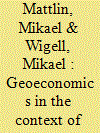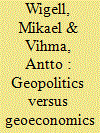|
|
|
Sort Order |
|
|
|
Items / Page
|
|
|
|
|
|
|
| Srl | Item |
| 1 |
ID:
145423


|
|
|
|
|
| Summary/Abstract |
This article argues that geoeconomics, defined as the geostrategic use of economic power, has become an increasingly important feature of regional powers’ strategic behavior. Yet, we still lack analytical tools to identify and compare regional powers’ geoeconomic strategies. The article marks a first attempt to develop a typology for differentiating potential geoeconomic strategies that regional powers may pursue in dealing with their corresponding regions. It merges the regional power focus with a geoeconomic perspective, producing the following four ideal-typical strategies: neo-imperialism, neo-mercantilism, hegemony, and liberal institutionalism.
|
|
|
|
|
|
|
|
|
|
|
|
|
|
|
|
| 2 |
ID:
177880


|
|
|
|
|
| Summary/Abstract |
Western democracy is being attacked like never before, but not through overhyped “hybrid warfare.” It is in reality threatened more acutely by hybrid interference, attacks that are often subtle, manipulating for cover the very same liberal democratic values that the attack is designed to subvert. The cornerstones of Western democracy—state restraint, pluralism, free media, and economic openness—provide openings for authoritarian actors to interfere in democratic society through a host of covert, non-military means calibrated to undermine their internal cohesion and accelerate political polarization.
|
|
|
|
|
|
|
|
|
|
|
|
|
|
|
|
| 3 |
ID:
145422


|
|
|
|
|
| Summary/Abstract |
Geoeconomic power and its use appear to be a crucial, albeit understudied aspect of today’s international relations. Traditionally, international power has been thought of in geopolitical rather than geoeconomic terms. Indeed, ever since the famous debate about sea power and land power between Alfred Thayer Mahan and Halford MacKinder at the cusp of the twentieth century, scholars have linked geography with the pursuit of political and military power.
|
|
|
|
|
|
|
|
|
|
|
|
|
|
|
|
| 4 |
ID:
145288


|
|
|
|
|
| Summary/Abstract |
Geopolitics and geoeconomics are often addressed together, with the latter seen as a sub-variant of the former. This article shows the usefulness of differentiating them at a conceptual level. By juxtaposing traditional geopolitics and geoeconomics, we suggest that they have remarkably different qualities and implications for their targets, on both national and international levels. Importantly, these include the formation of alliances, and whether they are driven by balancing, bandwagoning or underbalancing dynamics. An analysis of Russia's shifting geostrategy towards Europe shows these differences in practice. Russian geoeconomics has long been successful as a ‘wedge strategy’, dividing the EU. As a result, the EU has underbalanced and its Russia policies have been incoherent. The observable tendencies in 2014–15 towards a more coherent European approach can be explained by the changing emphasis in Russia's geostrategy. Russia's turn to geopolitics works as a centripetal force, causing a relative increase in EU unity. Centripetal tendencies due to heightened threat perception can be observed in the economic sanctions, emerging German leadership in EU foreign policy, and discussion on energy union. The analysis calls for more attention to the way strategic choices—geopolitics versus geoeconomics—affect the coherence of threatened states and alliance patterns.
|
|
|
|
|
|
|
|
|
|
|
|
|
|
|
|
| 5 |
ID:
165038


|
|
|
|
|
| Summary/Abstract |
‘Hybridity’ is in vogue these days. Yet, the utility of the hybrid label is often contested in security studies. A problem relates to how the concept of hybrid warfare has been extended to cases that have little in common with the cases from which the concept was originally derived. This article suggests making a conceptual distinction between hybrid warfare and hybrid interference. The article is devoted to developing this latter, new strategic concept. In essence, hybrid interference is conceptualized as a ‘wedge strategy’, namely a policy of dividing a target country or coalition, thereby weakening its counterbalancing potential. By drawing particularly on recent practices by China and Russia, the article shows how hybrid interference uses a panoply of state-controlled, non-kinetic means, which are more or less concealed in order to provide the divider with plausible deniability and to control targeted actors without elevating their threat perceptions. Three main bundles of means are central to hybrid interference: 1) clandestine diplomacy; 2) geoeconomics; and 3) disinformation. The article shows how western democracies are vulnerable to hybrid interference. Hybrid interference makes use of the liberal values that characterize western democracy, exploiting them as opportunities to drive wedges through democratic societies and undermine governability. The article argues that this sort of external interference has been overlooked in the debate on democratic deconsolidation, that it is becoming more common, and discusses some counter-measures to defend against it.
|
|
|
|
|
|
|
|
|
|
|
|
|
|
|
|
|
|
|
|
|